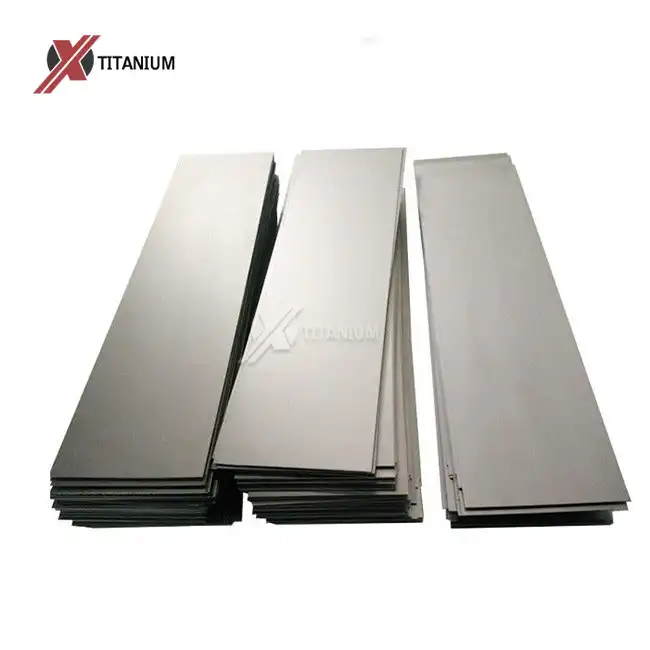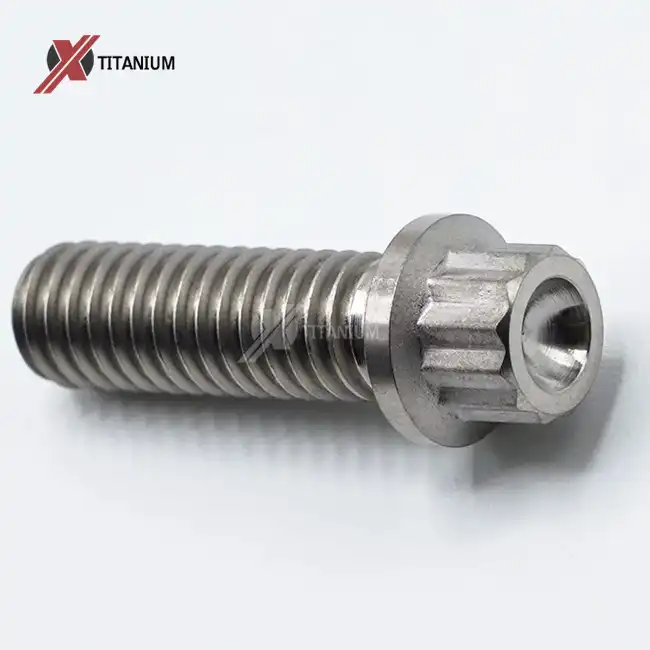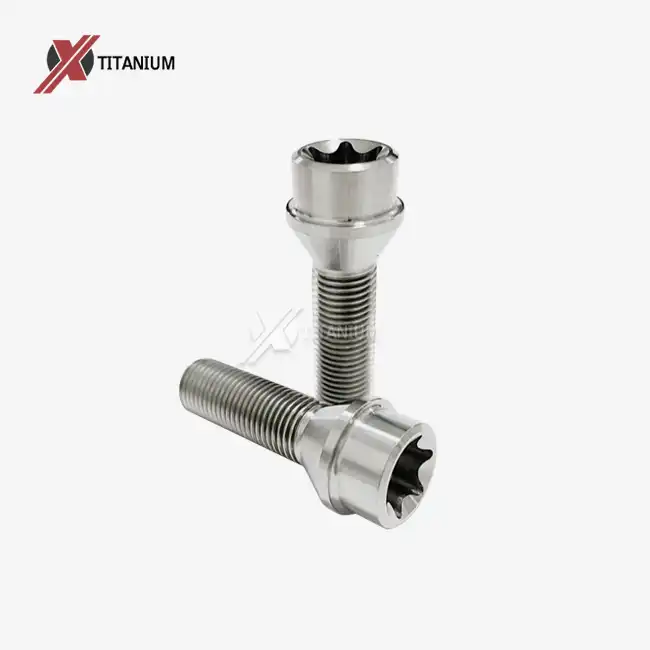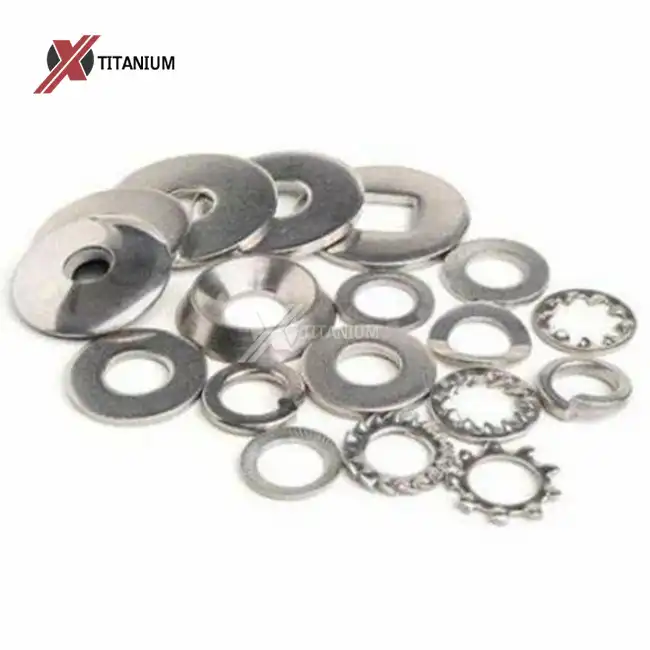Titanium Bicycle Bolts: Composition and Properties
Titanium bicycle bolts have gained immense popularity in the cycling world due to their unique combination of strength, lightweight, and corrosion resistance. These bolts are typically made from Grade 5 titanium alloy, also known as Ti-6Al-4V, which consists of 90% titanium, 6% aluminum, and 4% vanadium. This composition results in a material that boasts an impressive strength-to-weight ratio, making it ideal for high-performance bicycles.
The properties of titanium bicycle bolts set them apart from traditional steel or aluminum alternatives. With a density of about 4.43 g/cm³, titanium is approximately 40% lighter than steel, yet it maintains comparable strength. This characteristic allows cyclists to reduce the overall weight of their bikes without compromising on structural integrity. Moreover, titanium's natural oxide layer provides excellent corrosion resistance, ensuring that these bolts remain pristine even in harsh environmental conditions.
Mechanical Strength and Durability
Titanium bicycle bolts exhibit exceptional mechanical properties that contribute to their longevity and reliability. The Grade 5 titanium alloy used in these bolts typically has a tensile strength of around 900 MPa, which is significantly higher than many steel variants. This high tensile strength translates to superior resistance against deformation and breakage under stress.
Furthermore, titanium's fatigue resistance is noteworthy. Cyclic loading, a common occurrence in bicycle components, can lead to material fatigue over time. However, titanium's ability to withstand repeated stress cycles without significant degradation ensures that these bolts maintain their integrity even after prolonged use. This characteristic is particularly valuable in critical areas of a bicycle where bolt failure could lead to catastrophic consequences.
Corrosion Resistance and Environmental Adaptability
One of the standout features of titanium bicycle bolts is their remarkable corrosion resistance. The material's ability to form a stable, protective oxide layer on its surface provides a natural defense against various corrosive elements. This property is especially beneficial for cyclists who frequently ride in coastal areas or regions with high humidity, where traditional steel bolts might succumb to rust and degradation.
The corrosion resistance of titanium extends beyond mere aesthetic preservation. It also ensures that the bolts maintain their structural integrity and ease of use over time. Unlike steel bolts that may seize due to corrosion, titanium bolts are less likely to become stuck or difficult to remove, even after prolonged exposure to harsh conditions. This characteristic not only enhances the longevity of the bolts but also simplifies maintenance procedures for cyclists and mechanics alike.
Factors Influencing the Stripping Resistance of Titanium Bolts
While titanium bicycle bolts are inherently resistant to stripping, several factors can influence their performance in this regard. Understanding these elements is crucial for cyclists and mechanics to maximize the lifespan and effectiveness of these high-quality components.
Thread Design and Manufacturing Precision
The thread design of titanium bicycle bolts plays a significant role in their resistance to stripping. Precision-engineered threads with optimal pitch and depth distribution ensure even load distribution along the bolt's length. This even distribution helps prevent stress concentration at specific points, which could otherwise lead to premature wear or stripping.
Manufacturing precision is equally important. High-quality titanium bicycle bolts are produced using advanced CNC machining techniques that ensure tight tolerances and smooth thread profiles. This precision contributes to better engagement between the bolt and the threaded hole, reducing the likelihood of stripping even under high torque conditions.
Proper Installation and Maintenance Practices
Even the most well-designed titanium bicycle bolts can be susceptible to stripping if not properly installed or maintained. Using the correct tools, such as torque wrenches calibrated for titanium bolts, is essential to avoid over-tightening. Over-torquing can lead to thread deformation or, in extreme cases, bolt failure.
Regular inspection and maintenance of titanium bolts are also crucial. While these bolts are highly corrosion-resistant, periodic cleaning and inspection can help identify any potential issues before they escalate. Additionally, applying an appropriate anti-seize compound during installation can further protect against galling and make future removals easier.
Material Compatibility and Load Distribution
The interaction between titanium bicycle bolts and the materials they're fastening is another important consideration. Titanium's galvanic properties can sometimes lead to issues when paired with certain metals, potentially affecting long-term performance. Proper material selection for mating components and the use of appropriate washers or spacers can help mitigate these concerns.
Effective load distribution is also key to preventing stripping. Ensuring that the bolt's head and the fastened components have proper contact area helps distribute forces evenly. This distribution reduces the likelihood of localized stress that could lead to thread damage or stripping over time.
Comparative Analysis: Titanium vs. Other Materials in Bicycle Bolts
To fully appreciate the benefits of titanium bicycle bolts, it's valuable to compare them with other common materials used in bicycle fasteners. This comparison highlights why many cyclists and manufacturers opt for titanium despite its higher cost.
Titanium vs. Steel Bolts
Steel has long been the standard material for bicycle bolts due to its strength and affordability. However, titanium offers several advantages over steel. Firstly, titanium bolts are significantly lighter, often weighing 40-45% less than their steel counterparts. This weight reduction can be substantial when considering the total number of bolts on a bicycle.
In terms of strength, high-grade titanium alloys used in bicycle bolts can match or exceed the tensile strength of many steel variants. Moreover, titanium's superior corrosion resistance gives it a significant edge over steel, especially in harsh environments or for riders who frequently expose their bikes to moisture or salt air.
Titanium vs. Aluminum Bolts
Aluminum bolts are often chosen for their lightweight properties, but they fall short in several areas compared to titanium. While aluminum bolts are indeed light, they lack the strength and durability of titanium. Aluminum is more prone to fatigue and can deform under high stress, making it less suitable for critical fastening applications on a bicycle.
Titanium bolts offer a better balance of weight savings and strength. They provide the lightweight advantage of aluminum while delivering superior tensile strength and fatigue resistance. Additionally, titanium's corrosion resistance far surpasses that of aluminum, which can be susceptible to galvanic corrosion when in contact with other metals.
Long-term Performance and Cost-Effectiveness
When considering long-term performance, titanium bicycle bolts often prove to be a cost-effective choice despite their higher initial price. Their resistance to corrosion, fatigue, and stripping means they typically outlast both steel and aluminum alternatives. This longevity can result in fewer replacements over the life of a bicycle, potentially offsetting the higher upfront cost.
Furthermore, the peace of mind that comes with using high-quality, durable components can be invaluable for serious cyclists. The reduced risk of bolt failure during critical moments, such as high-speed descents or intense racing scenarios, adds an intangible but significant value to titanium bolts.
Conclusion
Titanium bicycle bolts represent a pinnacle in fastener technology for cycling applications. Their exceptional resistance to stripping, combined with outstanding strength-to-weight ratio and corrosion resistance, makes them an excellent choice for cyclists seeking top-tier performance and reliability. While proper installation and maintenance remain crucial, the inherent properties of titanium significantly reduce the risk of stripping compared to other materials.
If you're interested in exploring high-quality titanium bicycle bolts or have questions about their application in your cycling setup, don't hesitate to reach out to the experts at Baoji Chuanglian New Metal Material Co., Ltd. Contact us at info@cltifastener.com or djy6580@aliyun.com for personalized advice and product information.




